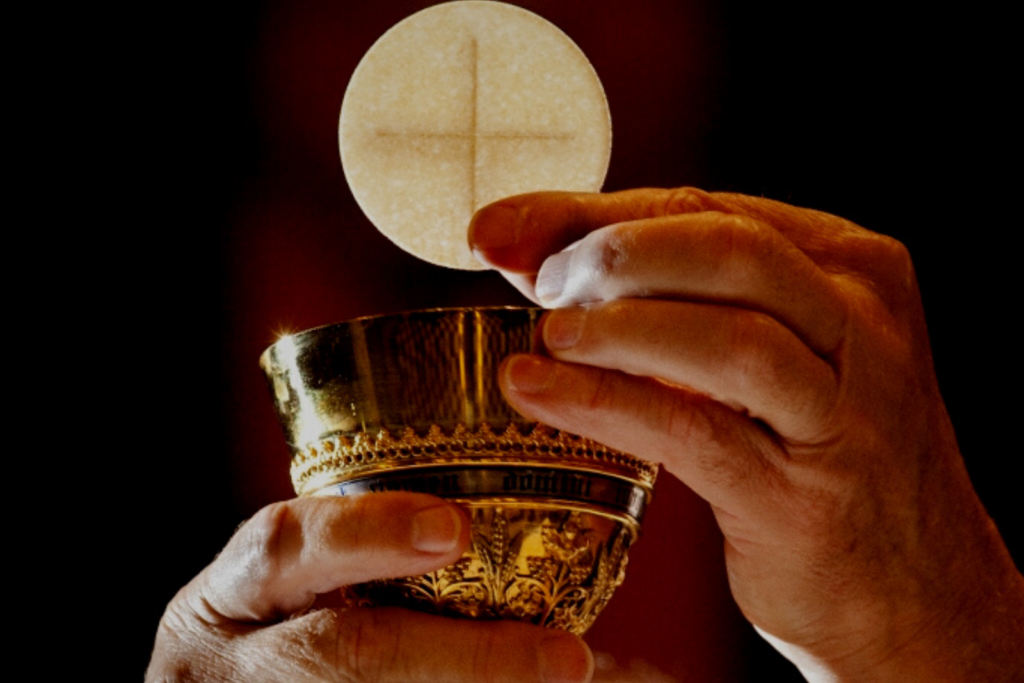
The manger: Lessons from King Ahaz
If the name of Ahaz rings a bell, it’s because we hear it twice at this time of year: In the daily liturgy of Friday, December 17th in the genealogy of Jesus Christ: “…Jotham the father of Ahaz, Ahaz the father of Hezekiah…” That so unbelievably colorful and earthy lineage of Abraham and King David: the Lord’s family tree.
And then a more detailed reading about the Israeli King Ahaz this past Monday:
The LORD spoke to Ahaz:
Ask for a sign from the Lord, your God;
let it be deep as the nether world, or high as the sky!
But Ahaz answered,
“I will not ask! I will not tempt the LORD!”
Then Isaiah said:
Listen, O house of David!
Is it not enough for you to weary men,
must you also weary my God?
Therefore the Lord himself will give you this sign:
the virgin shall conceive and bear a son,
and shall name him Emmanuel.
Taken out of any historical context, Ahaz’s response sounds respectful, even reverent.
“I will not ask! I will not tempt the Lord!”
And so we wonder why the prophet responds with such anger?
Fr. John Farao celebrated the mass that Monday morning and explained that perplexing reading from the book of Isaiah. He informs us of the “backstory” that clarifies the confounding conversation between Ahaz and Isaiah.
Hence the backstory
At the time of Isaiah’s writing, Ahaz faced the combined forces of Assyria and the northern kingdom of Israel and was terrified for his small army was no match to those of the invaders. Impelled by the Lord, Isaiah instructed King Ahaz not to fear Rezin, the King of Assyria or Pekah, the King of Israel, that he and his people could rely on the Lord for protection. All the king needed to do was ask.
We citizens of the 21st-century know-or should- the risk of judging actions and situations without understanding the context-the backstory. And sometimes, if we’re willing to see them, we witness the consequences of judgements made in haste, without all the facts .
Ahaz found himself hard-pressed by the united armies of Pekah and Rezin. The position of Jerusalem seemed very precarious. The Prophet Isaiah tried his best to encourage Ahaz and assure him that G‑d would save the city from the hands of the enemies. But Ahaz had no trust in G‑d. He sent a delegation of noblemen to Tiglath-Pileser, the powerful king of Assyria, with presents of gold and silver taken from the treasures of the Temple and his own palace. Ahaz instructed his envoys to hand over these presents to the king of Assyria with the following words: “I am your servant and son. Save me from the hands of the kings of Syria and Israel who have gone to war against me.”
Tiglath-Pileser was only too glad to take this opportunity to subdue these two states and gain an outlet to the sea. He marched on Damascus and thus forced Rezin of Syria to abandon the siege of Jerusalem. Rezin himself was captured and killed by the Assyrians. At that time Syria was incorporated into the Assyrian empire and at the same time Tiglath-Pileser also annexed part of the land of Israel…
Delivered from his enemies, Ahaz traveled to Damascus to thank his liberator and patron, the victorious Tiglath-Pileser. He was accorded the usual courtesy, but he was made aware of his status of dependence. In Damascus Ahaz saw a famous heathen altar which he admired so much that he had it copied and sent to Jerusalem to the High Priest Uriah, with the command to put it up in the Holy Temple. After his return from Damascus, he himself sacrificed on this altar, and forced the priests to offer the daily sacrifices on it.KIng Ahaz Jewish history
Although a weak and idolatrous king, Ahaz is beloved by the Lord, just like each of us.
He speaks through Isaiah, encouraging Ahaz and the people not to fear Rezin and Pekah.
“I will not ask!”
“I will not tempt the Lord!”
Is it pride?
Or ignorance?
Or merely sheer willfulness?
Now we understand.
Isaiah’s words are the Lord’s:
Listen, O house of David!
Is it not enough for you to weary men,
must you also weary my God?
Therefore the Lord himself will give you this sign:
the virgin shall conceive and bear a son,
and shall name him Emmanuel.
Each one of the 7 and a half billion souls on the planet knows the many times we have wearied men and also our God. No amount of justification or pretense can eradicate the reality of our refusal to love, forgive and repent as we know we must. We too have refused His mercy, ignored His pleas to look up, ask Him for help.
I’ve written before about the astounding relevance of the Old Testament.
At times, the ancient stories function as spotlights not just for our lives but the immensity, the boundlessness of God’s love and mercy for each human soul. Learning the backstory about King Ahaz has done exactly that for me.
Despite the years of wanton rebellion, flaunting of the Law and blasphemous conduct, God still works to save Ahaz from himself!
Wowza!
Thus, is there any sin of yours and mine- or of anyone else- that this majestic, mysterious and merciful God will not forgive?
All we need to do is bend our necks and knees and ask, maybe beg– for ourselves- and for all the King Ahaz’s in our world.
Each one of these Christmases we experience in our lives as believers is miraculous. This decision of the Lord of the Universe to empty Himself and condescend to incarnate as a human baby so that our view of Him will not be one of fear of His judgement but of love.
But this one, this year of 2021, is best described by words written eighty years ago, in 1940, in Eleanor Roosevelt’s preface to Christmas, A Story. “The times are so serious that even children should be made to understand that there are vital differences in people’s beliefs which lead to differences in behavior.” In celebrating His birth as the divine infant, let us learn to love our littleness and no longer fear our inadequacies and imperfections.
We’re now given another precious chance at the manger.
This year let’s reflect more deeply about the familiar creche, Mary and Joseph and the ninety-mile journey to Bethlehem and cast off all of the superficial explanations of the Incanation. Perhaps considering these questions:
- Is it likely or even possible that the Lord of the Universe left the details, the manner, people and place of His birth up to chance?
- That Emperor Augustus just happened to declare the need for a census requiring Joseph and Mary to travel from Nazareth to Bethlehem?
- Or that the too small inn was happenstance?
- And, my favorite of them all, could St. Joseph have genuinely believed that Mary had lain with another man?
Brad Pitre explains, “The hidden king: St. Joseph.”
The twofold generation of Christ is admirable; the first, His birth of a Father without a mother, is eternal; the second, His birth of a Mother without a father, happened in time. Eternal Himself, He was born of His eternal Father.
Why do you wonder? He is God. Consider His divinity, and all cause for wonder will cease. Let amazement pass away; let praise ascend; let faith be present; believe what has happened.
Has not God humiliated Himself enough for you? He who was God became Man. The inn was too small; wrapped in swaddling clothes, He was placed in a manger. Who does not marvel? He who fills the world found no room in an inn. Placed in a manger, He became our food. St Augustine Sermon 189
Pope Benedict explains further.
“Augustine drew out the meaning of the manger using an idea that at first seems almost shocking, but on closer examination contains a profound truth. The manger is the place where animals find their food. But now, lying in the manger, is he who called himself the true bread come down from heaven, the true nourishment that we need in order to be fully ourselves. This is the food that gives us true life, eternal life. Thus the manger becomes a reference to the table of God, to which we are invited so as to receive the bread of God. From the poverty of Jesus’ birth emerges the miracle in which man’s redemption is mysteriously accomplished.”
— Pope Benedict XVI, p. 68




